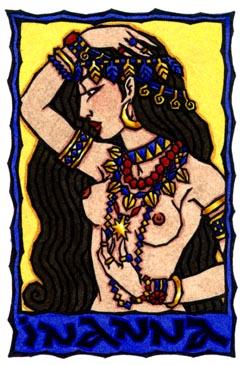 (Samhain altar, 2007)
(Samhain altar, 2007)Two years ago this weekend, we held a Samhain ritual at our home, and when we invoked our dead, nearly everyone called upon a beloved dog who had passed beyond the veil. The next day, on an impulse visit to the SPCA, we met our beloved Lugh, a brindle pitt-mix puppy who we knew, immediately, was ours. He joined our family that weekend, and we began to learn the very special love that is dog-love. We came to believe that Lugh was a guardian spirit who had manifested in our lives at that time, in that doggy body, to see us both through the challenging months ahead, to teach us and love us.
One month ago, to our great shock and sadness, Lugh decided it was time to move on from this earthly life. He was only two years old. It was such a clear and decisive move on his part. The signs snapped into focus the moment he was gone.
On his morning walk with David, on his last day, there was a great blue heron in the creek outside our house. We live downtown, and that's an unusual sight. She caught Lugh's attention; he turned his head to stare after her as she flew away. Heron is a spirit messenger, a guardian who stands
at the gateway of life and death.
That afternoon, the three of us hiked with a friend and another dog. We were startled by a flush of wild turkeys taking off into the air, so taken with surprise that we didn't see Lugh cross the path and dart after them, down a steep, brush-filled incline, into rush hour traffic. The other dog ran back and forth at the path's edge, as if there were a barrier stopping him from following. Wild turkeys, according to Indian lore in the southwestern United States, guide spirits between this world and the next.
We didn't see Lugh run after the turkeys, but when we heard the sickening sound of a truck striking him, David tore down the hill. I sent our friend back for the car, and I stumbled down after David. By the time I reached the side of the road, David was holding him. There was hardly a mark on his body, but one look in his eyes, and I knew he'd followed those damn turkeys right up into the sky. His heart beat perhaps a minute more, and his breath was warm. Then they both stopped. We held him and petted him. I sang to him as I always did to comfort him. We told him that it was okay to leave, that we wished him safe passage, that we loved him very, very much.
These are the blessings in the moment of death, that we could both be with him, that he didn't suffer.
He was my spiritual teacher and dear friend. I believe that he is with me still, here right next to me on the couch as he used to be, in the world of spirit that is so close we can almost touch it, especially at this time of year. But I miss his earthly form so very, very much.
Sweet Lugh, your powerful spirit touched so many people and dogs during your short time with us. We love you. We miss you. We know you still, and always.
And did you get what
you wanted from this life, even so?
I did.
And what did you want?
To call myself beloved, to feel myself
beloved on the earth.
(Raymond Carver, "Last Fragment")
 (Painting by Kazuya Akimoto)
(Painting by Kazuya Akimoto)




